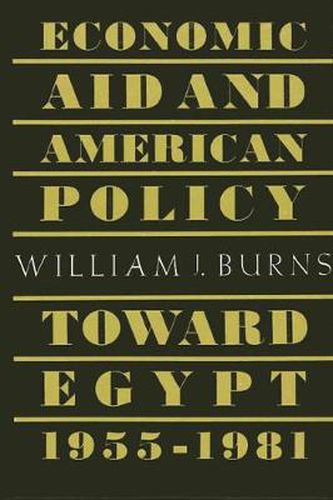Readings Newsletter
Become a Readings Member to make your shopping experience even easier.
Sign in or sign up for free!
You’re not far away from qualifying for FREE standard shipping within Australia
You’ve qualified for FREE standard shipping within Australia
The cart is loading…






Gamal Abdel Nasser’s 1955 decision to barter Egyptian cotton for Soviet bloc weaponry thrust Egypt onto center stage in the Cold War in the Middle East. What Egypt needed most, and what the United States was uniquely equipped to provide, was economic aid. For the Egyptian government–eager to take rapid strides toward economic development but crippled by a burgeoning population, a paucity of arable land, and a meager reserve of foreign exchange–American economic aid promised to serve as an enormously important crutch. For American policymakers, economic assistance appeared to be an ideal means of developing American influence in Egypt. Few aid relationships in the last three decades can match the drama and significance of the U.S.-Egyptian experience. This study shows how the American government attempted to use its economic aid program to induce or coerce Egypt to support U.S. interests in the Middle East in the quarter century following the 1955 Czech-Egyptian arms agreement. William J. Burns has analyzed recently released government documents and interviews with former policymakers to throw light on the use of aid as a tool of American policy toward the Nasser regime. He also offers valuable observations on the role of the American economic assistance program in the Sadat era.
$9.00 standard shipping within Australia
FREE standard shipping within Australia for orders over $100.00
Express & International shipping calculated at checkout
Gamal Abdel Nasser’s 1955 decision to barter Egyptian cotton for Soviet bloc weaponry thrust Egypt onto center stage in the Cold War in the Middle East. What Egypt needed most, and what the United States was uniquely equipped to provide, was economic aid. For the Egyptian government–eager to take rapid strides toward economic development but crippled by a burgeoning population, a paucity of arable land, and a meager reserve of foreign exchange–American economic aid promised to serve as an enormously important crutch. For American policymakers, economic assistance appeared to be an ideal means of developing American influence in Egypt. Few aid relationships in the last three decades can match the drama and significance of the U.S.-Egyptian experience. This study shows how the American government attempted to use its economic aid program to induce or coerce Egypt to support U.S. interests in the Middle East in the quarter century following the 1955 Czech-Egyptian arms agreement. William J. Burns has analyzed recently released government documents and interviews with former policymakers to throw light on the use of aid as a tool of American policy toward the Nasser regime. He also offers valuable observations on the role of the American economic assistance program in the Sadat era.